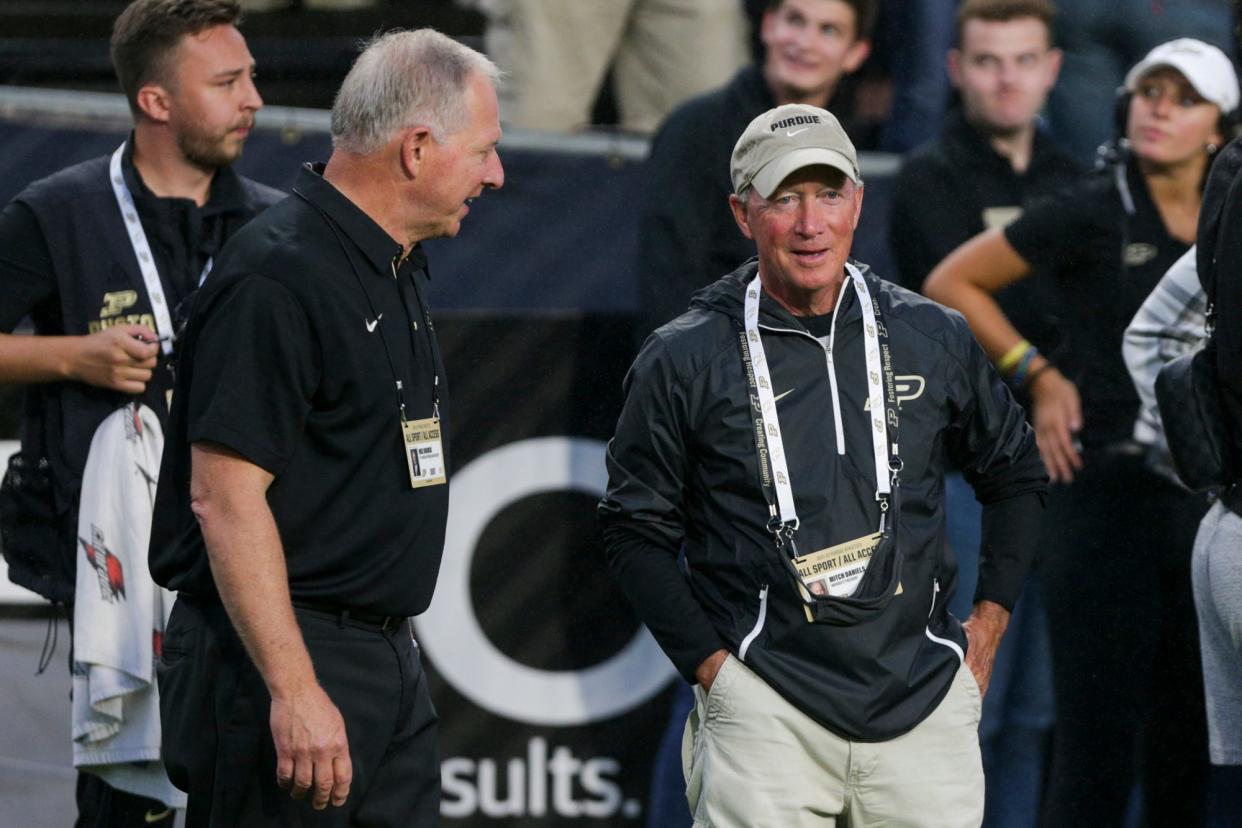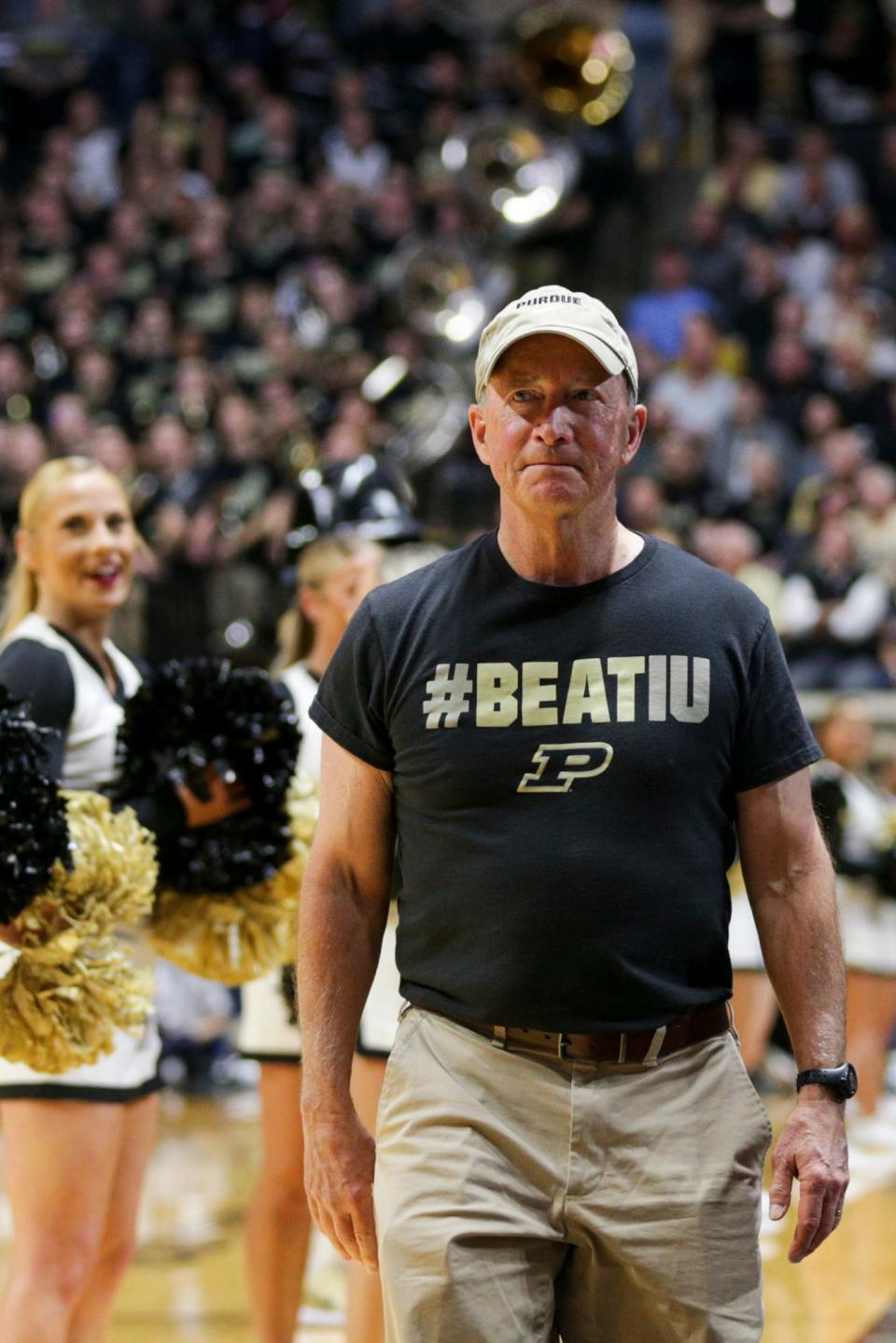Purdue athletics under president Mitch Daniels: 'I think we have the balance right'

- Oops!Something went wrong.Please try again later.
- Oops!Something went wrong.Please try again later.
WEST LAFAYETTE – When Mitch Daniels arrived on campus as Purdue University President, the former governor of Indiana had strong feelings about the direction of college athletics.
He didn’t like it and still sees plenty of issues and problems. Daniels wasn’t alone but elected to stay in the background during the course of his tenure in West Lafayette.
As Daniels exits his post after a decade, the issues surrounding intercollegiate athletics, the NCAA and even at the Big Ten level have dramatically changed to where the focus has shifted to what happens off the court than the actual games.
Most of the athletic department's facility additions and upgrades have been funded through donations but the perception of spending $65 million on the Kozuch Football Performance Complex and the upcoming Ross-Ade Stadium renovation project, which carries a $45.4 million price tag for Phase 1, isn't lost on Daniels.
While spending is on the rise, thanks to gigantic media rights agreements, the emergence of Name, Image and Likeness for athletes and the evolution of the transfer portal, Daniels reflects on what’s transpired under his watch and what’s next from an athletic perspective as he leaves office at the end of the year.
Here is the first part of a conversation with Daniels:
Carmin: Early in your tenure, you said that college athletics was out of control from a spending standpoint. Do you still feel that way now? Do you feel Purdue has stayed above the fray and how have you balanced the two with your beliefs and where the state of college athletics is today?
Daniels: I think any fair observer would say that, at least in places, the spending is more out of control, further out of control than it was but I feel now as I did then that Purdue does operate under better control and in other ways, it stands a step or two apart from most of our competition. I think that's a lot to be proud of.
Carmin: Are you comfortable with what’s gone on during your tenure in terms of facilities, coaches pay, etc.?
Daniels: I feel more than comfortable. I feel proud of them. You'll remember over and over I said there's some prerequisites and I think we're still honoring those. Every year I go when they have their once-a-year meeting and they talk about the rules and so forth. I thanked them for 10 years and I've never had to apologize because look at what's happened to some of the folks with my job and other Big Ten schools? Standards? Absolutely. Our academics have gotten better over the 10 years, and I think they've paid a lot of additional attention to that. Plenty to feel good about there and then back to your spending and so forth, they've handled themselves and really both of our ADs (Morgan Burke, Mike Bobinski), but just looking at Mike these last few years, it seems to me that we're doing a better job than ever of supporting the student-athletes. They do things now – nutrition, mental health, additional academic support and some of the extra things they've been doing with the engagement with the community. I just think that our fans have a lot to be proud of.
Carmin: But there's necessary spending that has to go on, right?
Daniels: Absolutely. I think we have the balance right. We always want to be as competitive as we can be without crossing lines, either of integrity or excess. I think that it's a tough thing to do. To live by the standards that Purdue historically has, and still be competitive, is tricky. You can go one way or the other. You could mail it in, or you could chuck the standards and maybe you'd win a couple more games.

But so to some extent, I think that Mike and our coaches and the whole outfit over there have one of the tougher challenges in college sports, but I think we should all feel pretty darn good about how they handle it. Sure, salaries have gone up, but not crazy. I'm not picking on anybody, but I've not been in the position where we had to eat umpteen million dollars early in a season. These kinds of corners that some programs have painted themselves into, I can't think of a program or department that's handled itself any better in this really wild world we're in now.
Carmin: When you started, topics like NIL, transfer portal, some of the other things that have come up in the last couple of years we're not even on the radar.
Daniels: That's probably right.
Carmin: Now, as you leave these subjects dominate college athletics more than the games at times. Where do you see where it’s at and where do you see it going over the next few years?
Daniels: It’s got to go somewhere; this can't be the right place. Both those two topics - the NIL and the transfer portal - the principle is clear, and I think the principle is certainly one I find correct that the athlete should have, if they have the potential, should have the right to earn something off the renown that their skills have created for him. It's also hard to argue that there shouldn’t be too many restrictions on the ability to move from place to place if a student-athlete thinks that there's a better home for him or her. But right now, in both those environments, there are no rules so people can't say they're operating outside the rules; the rules right now don't exist. That can't be the right answer. You're going to continue to until someone finds a way to define boundary conditions. You're going to continue to see things that make you wince, or worse.
So again, no quarrel with the basic principle involved. But both these things and some others I guess we could name, I think, left completely to the wild, what you'll have at the end, and I keep saying you won't be able to call it college sports. It's something different.
I love that we've been able to watch Aiden O'Connell grow from a walk-on to a legitimate star at our school. If he had just come in and it was his fourth school, which I think there's a couple of them out there, we might be happy to have them. It would detract from that great unifying spirit that sports at their best bring to campus.
Carmin: Aidan O’Connell has been here, but free agency and transfer portal has brought players here.
Daniels: We have a bunch. Glad to have them but again, one of the first rules of life – and maybe the first rule of life is quote, ‘up to a point. Right?’ There are a lot of things which are good - up to a point.
Carmin: You’re a college president and college presidents rule the NCAA.
Daniels: Well, allegedly.
Carmin: That's the board. The board is the presidents but how do the presidents get a hold of this?
Daniels: I think people looking backward have faulted presidents as a whole. I don't know, there are 6,000 colleges, what's the NCAA got 1,100 members or something like that. I suppose that's fair. Somebody in that group should have taken valuable time from their day job and spent working on that on the board.
Nobody can, I don't believe, defend the record of the NCAA or where we wound up, but I have some sympathy for the difficulty of their position, both internally and externally. They may just have been on a mission impossible here. And of course, in the last two or three years, the courts have sort of taken them out, so they can't put rules around some of these things. I suppose that's right from a matter of anti-trust law, and so forth. But it begs a question if not them, who or how? I don't have that answer.
Carmin: Why didn't you get more involved with these issues with your beliefs and how it should be run?
Daniels: I wasn't invited for one but that's not an excuse. That's a pretty big job, at least the way I like to approach it, and it's been more than enough to keep me busy. This is job one. I confess – and forget the NCAA - I didn't seek or play a very active role in the Big Ten. I could easily have spent more time and made more noise there. I've spoken up. I haven't, I don't believe, failed to represent us in that way. But I've not been on their executive committee and that sort of thing. I’m the senior - it’s amazing, I still feel like a rookie in this higher ed thing - but I'm the senior member of the Big Ten Presidents Council. It turns out it's a high-turnover job.
But the point is, I've been there longer than anybody. I just didn't choose to, with time being your scarcest resource, I didn't choose to invest more of it. I think I've invested an appropriate amount of time. I think both our ADs would say this in supporting our program and I worked with them on issues they had. I've paid a lot of attention to athletics, but it's been Purdue athletics. I'm under no illusions that even if I had gone and spent a lot of time on the bigger questions, I would have moved the needle.
Mike Carmin covers Purdue sports for the Journal & Courier and USA Today Sports Network. Email mcarmin@gannett.com and follow on Twitter and Instagram @carmin_jc
This article originally appeared on Lafayette Journal & Courier: Purdue athletics under president Mitch Daniels: 'I think we have the balance right'

